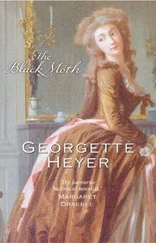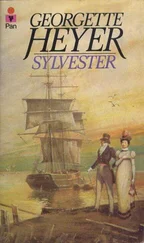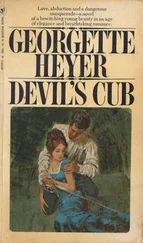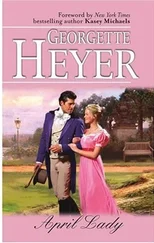April Lady - Georgette Heyer
Здесь есть возможность читать онлайн «April Lady - Georgette Heyer» весь текст электронной книги совершенно бесплатно (целиком полную версию без сокращений). В некоторых случаях можно слушать аудио, скачать через торрент в формате fb2 и присутствует краткое содержание. Жанр: Книги. Описание произведения, (предисловие) а так же отзывы посетителей доступны на портале библиотеки ЛибКат.
- Название:Georgette Heyer
- Автор:
- Жанр:
- Год:неизвестен
- ISBN:нет данных
- Рейтинг книги:3 / 5. Голосов: 2
-
Избранное:Добавить в избранное
- Отзывы:
-
Ваша оценка:
- 60
- 1
- 2
- 3
- 4
- 5
Georgette Heyer: краткое содержание, описание и аннотация
Предлагаем к чтению аннотацию, описание, краткое содержание или предисловие (зависит от того, что написал сам автор книги «Georgette Heyer»). Если вы не нашли необходимую информацию о книге — напишите в комментариях, мы постараемся отыскать её.
Georgette Heyer — читать онлайн бесплатно полную книгу (весь текст) целиком
Ниже представлен текст книги, разбитый по страницам. Система сохранения места последней прочитанной страницы, позволяет с удобством читать онлайн бесплатно книгу «Georgette Heyer», без необходимости каждый раз заново искать на чём Вы остановились. Поставьте закладку, и сможете в любой момент перейти на страницу, на которой закончили чтение.
Интервал:
Закладка:
"That, Nell, is patent!" he said.
"Yes—I mean, I knew you would be vexed! There was no harm in it—it all arose out of a—a stupid wager—but of course it was a most improper thing to do, and so I told him."
"All arose out of a wager?" he repeated incredulously. "With which of his associates did Dysart see fit to make you the subject of a wager?"
"N-not with any of them!" she stammered, frightened by the look on his face.
"Then what the devil do you mean?" he demanded.
"It was with me!" she said, improvising desperately. "We—we were talking about masquerades, and I said it was nonsense to suppose that one wouldn't recognize somebody one knew well just because they wore a mask. Dy—Dy said that he would prove me wrong, and—and that was how it was! Only I did recognize him, so I won the wager."
"Gratifying! Did you also recognize his companions?"
"No—that is, it was only Mr. Fancot!" she said imploringly. "Oh, and Joe, of course—Dy's groom! But he doesn't signify, because he has always been with us, ever since I can remember! Pray, Cardross, don't be vexed with Dy!"
"Vexed with him! I am very much more than vexed with him! To be giving you such a fright for the sake of a prank I should find it hard to pardon in a schoolboy goes beyond anything of which I believed him to be capable!" he said wrathfully.
"I wasn't frightened!" she assured him. "Only a very little, at all events!"
"Oh?" he said grimly. "What, then, made you scream?"
Her eyes sparkled with indignation. "I did not scream! I would scorn to do anything so paltry! It was Letty who screamed."
"How chicken-hearted of her, to be sure!" he said sardonically.
"Well, that's what I thought," she said candidly.
"Are you quite blinded by your doting fondness for Dysart?" he demanded. "He is fortunate to possess a sister who can find excuses for his every folly, his every extravagance, and for such larks as this latest exploit! I am aware— I have for long been aware!—that he holds a place in your affections that is second to none, but take care what you are about! Encourage him to think he may turn to you in any extremity! smile upon kick-ups unworthy of a freshman! You will not smile when the high spirits you now regard with such indulgence carry him beyond the line of what even his cronies will pardon!"
She shrank a little from the harshness in his voice, but she was quick to recognize the note of jealousy in it. She heard it with a leap of the heart, and it took from his words all power of wounding. Instead of flying to Dysart's defense, she said merely: "Indeed I didn't smile upon such a prank! It was very bad—quite unbecoming! But it is unjust in you, Cardross, to say that his wildness will lead him into doing anything wicked! You dislike him very much, but that is going too far!"
"No, I don't dislike him," he replied, in a more moderate tone. "On the contrary! I like him well enough to wish to be of real service to him. You think me unjust, but you may believe that I know what I am saying when I tell you that his present way of life is ruinous."
She said, in swift alarm: "Oh, pray, pray don't thrust him into the army!"
"I have no power to thrust him into the army. I own I have offered to buy him a commission, and I have not the smallest doubt that there is nothing I might do for him which he would like better, or which would be of more benefit to him. If the only bar in the way of his accepting it is your father's dislike of the project I will engage to make all right in that quarter."
"No, it is not that. I should not say such a thing, but I am afraid Dy doesn't care much for what poor Papa wishes. But Mama made him promise he wouldn't do it, and however ramshackle you may think him Dy doesn't break his promises!"
"If that is how the case stands," he said, "I recommend you, my dear, to use your best endeavours to persuade your mother to release him from a promise which I don't scruple to tell you should never have been extracted from him!"
"I could not! Oh, she would sink under the very thought of his exposing himself to all the dangers of war!" She hesitated and then said, with a little difficulty: "Mama has had so many trials to bear. Poor Papa, you know . . ."
"Yes, I know," he replied. "For that very reason I am persuaded that if she was aware of the truth she would think the hazards of war less perilous than those of the metropolis. Living, as she now must, so far from London, I fancy she cannot know how closely Dysart is following an example she must dread."
She looked a little frightened, but said: "I know he is sadly wild, and—and—expensive, but surely—no worse than that?"
"Well, that is bad enough," he replied. He saw that she was inclined to question him more closely, but he was already vexed that he had allowed his irritation to betray him into saying so much. Before she could speak again he had turned the subject; and very soon after he left her, saying that he must change his habit. Whatever bitter feelings he might cherish he could not shock her by disclosing the full sum of Dysart's folly. She probably did not even know of that little narrow pink room behind the stage at the Opera House, where the dancers practiced their steps in front of long pier-glasses, and any buck in search of amatory adventures could have his pick of the west-end comets. Dysart was a familiar figure in that saloon, and so was his latest chère amie. Nell had certainly seen him driving with this article of virtue—a dasher of the first water, too! reflected Cardross—but what she had made of her one couldn't tell. She had asked no questions, so perhaps she had guessed. But she didn't guess that Dysart frequently sallied forth with the Peep o' Day boys, starting the evening with a rump and dozen at Long's, and gravitating thence to a less respectable world of which she was wholly ignorant. It diverted the wilder blades to mix on equal terms with the roughest elements of society; buttoning up, they would plunge into the back-slums of Tothill Fields, rubbing shoulders (and often falling into a mill) with all-sorts, from honest coat-porters to petermen. They saw badger-baiting in the reeking squalor of Charles's, where a man must be a very fly-cove to avoid having his pockets picked; they rubbed shoulders with bing-boys and their mollishers in the sluiceries; became half-sprung on the blue ruin in these gin shops, and, wandering eastward, deep-cut at the Field of Blood. The night music of the watchmen's rattles marked their progress through the sleeping town; often a drowsing Charley was overturned in his box, and sent sprawling into the kennel; many were the respectable householders brought down to their doors on false alarms of fire, or thieves. Sometimes these larks ended in a roundhouse, with its sequel of Bow Street, a false name, and a fine; sometimes a blade, fortunate enough to be numbered amongst Mother Butler's favourites, sought refuge at the Finish, and spent what was left of the night snoring on a settle beside the dying embers of the fire in the tap. No, Nell knew nothing of such exploits as these, and no prompting of jealousy was going to seduce her husband into enlightening her. The shock would be severe, and her innocence as much as her affection for Dysart would lead her to regard his excesses in a far more serious light than that in which they appeared to her husband. He was vexed by them, and he viewed their continuance with grim foreboding; but he believed that they sprang from the boredom of idleness rather than from any ingrained depravity. What disturbed him far more was the suspicion he had formed that Dysart, in his restless quest for novelty and excitement, had lately become enrolled as a member of the Beggars' Club.
This decidedly unsavoury institution had its locality in a cellar at the back of Broad Street, and was generally presided over by the Earl of Barrymore, with Colonel George Hanger as his Vice. It was patronized by all the raff of town, and such persons as those who thought it amusing to eat their suppers out of holes carved in a long table, and with knives and forks that were chained to their places. There was no particular harm in this, but the evils that could accrue from a young man's getting into Barrymore's set were grave enough, Cardross knew, to alarm even so casual a parent as Lord Pevensey. Old Georgie Hanger, for all his eccentricities, exercised little influence over the younger men. He was over sixty; and after a varied career, which began at Eton, rose to a commission in the 1st Footguards, reached its nadir in the King's Bench prison., and included an excursion into trade (when, upon his discharge from the Abbot's Priory, he set up as a coal-merchant), he had contrived to get himself restored to full-pay, and was now living rather more moderately. His age and his oddities caused him to be tolerated by society, but his manners were too coarse to render him an attractive figure; and, to do him justice, he had not the smallest desire either to figure as the leader of a set or to corrupt the morals of its members.
Читать дальшеИнтервал:
Закладка:
Похожие книги на «Georgette Heyer»
Представляем Вашему вниманию похожие книги на «Georgette Heyer» списком для выбора. Мы отобрали схожую по названию и смыслу литературу в надежде предоставить читателям больше вариантов отыскать новые, интересные, ещё непрочитанные произведения.
Обсуждение, отзывы о книге «Georgette Heyer» и просто собственные мнения читателей. Оставьте ваши комментарии, напишите, что Вы думаете о произведении, его смысле или главных героях. Укажите что конкретно понравилось, а что нет, и почему Вы так считаете.












